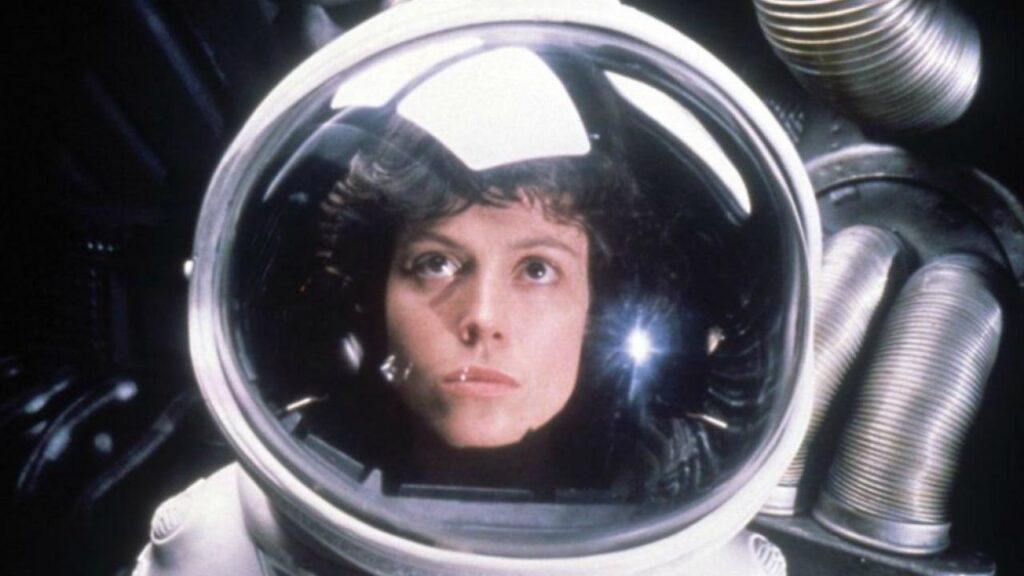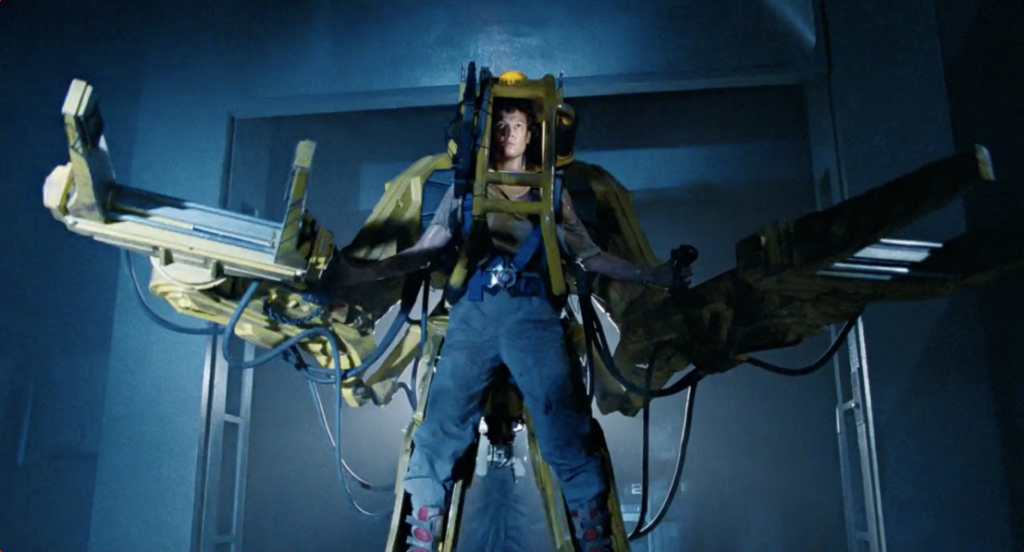Released in 1979, Ridley Scott’s Alien stands as a seminal work in the science fiction horror genre. The film initially garnered critical acclaim and commercial success, captivating audiences with its unique blend of horror and science fiction elements. Set in the distant future, the story follows the crew of the commercial space tug Nostromo as they encounter a deadly extraterrestrial creature, known as the Xenomorph, after responding to a distress signal from an uncharted planet.
Upon its release, Alien was praised for its atmospheric tension, groundbreaking special effects, and innovative design, particularly the terrifying alien creature conceived by artist H.R. Giger. The film’s success was not just a temporary phenomenon; it has left an indelible mark on popular culture and continues to influence the sci-fi and horror genres to this day. The claustrophobic setting of the spaceship, combined with the relentless threat posed by the Xenomorph, creates a sense of dread that has rarely been matched in cinema.
The plot’s simplicity is deceptive, as it allows for deep thematic explorations of survival, fear, and the unknown. The crew’s isolation in the vastness of space amplifies the horror elements, making the film a nerve-wracking experience from start to finish. This innovative fusion of sci-fi and horror, coupled with strong character development and a compelling narrative, has cemented Alien‘s status as a classic.
Moreover, Alien introduced audiences to one of cinema’s most enduring characters: Ellen Ripley, portrayed by Sigourney Weaver. Ripley’s character broke new ground for female protagonists in action and horror films, setting a precedent for future portrayals of strong, resourceful women. The film’s legacy extends beyond its immediate impact, inspiring numerous sequels, prequels, and a wide array of media adaptations, ensuring its place in the annals of film history.
Alien, an iconic creation
‘Alien’ begins with the crew of the commercial space tug Nostromo waking from stasis to investigate a mysterious signal emanating from a nearby moon. The crew, led by Captain Dallas, lands on the moon and discovers an alien spacecraft. During an exploratory mission, Executive Officer Kane encounters a nest of alien eggs within the derelict ship. One of the eggs releases a creature that attaches itself to Kane’s face, rendering him unconscious.
The crew brings Kane back to the Nostromo, where attempts to remove the creature prove futile. Eventually, the alien detaches and seemingly dies, and Kane awakens. However, during a subsequent meal, Kane experiences violent convulsions as a small, vicious alien creature bursts from his chest, killing him instantly. The creature rapidly grows into a menacing xenomorph, hiding within the ship’s labyrinthine corridors.
As the xenomorph begins to hunt the crew members one by one, the tension and suspense escalate. The crew devises various strategies to capture or kill the alien, but their efforts are thwarted by the creature’s strength, speed, and cunning. Key moments include the deaths of Captain Dallas and Engineer Parker, which underscore the xenomorph’s relentless and lethal nature.
The narrative reaches its peak when Ripley, the warrant officer, discovers that the ship’s computer, known as Mother, has been programmed by the company to prioritize the retrieval of the alien lifeform over the crew’s safety. This revelation adds another layer of tension, as Ripley realizes that she must rely on her own resourcefulness to survive.
The climax of the film sees Ripley as the last surviving member of the Nostromo. She initiates the ship’s self-destruct sequence and attempts to escape in a shuttle. However, the xenomorph stows away aboard the shuttle, leading to a final confrontation. Using her quick thinking and determination, Ripley manages to eject the alien into space, securing her place as one of the most resilient and iconic characters in contemporary cinema.

Ellen Ripley
Ellen Ripley, portrayed by Sigourney Weaver, stands as the central character in Ridley Scott’s seminal 1979 sci-fi horror film, ‘Alien.’ As the third officer aboard the commercial spaceship Nostromo, Ripley initially appears to be a relatively unassuming and pragmatic member of the crew. However, her character arc is profoundly transformative, marking her evolution from a competent officer to the film’s primary protagonist and an iconic figure in contemporary cinema.
Ripley’s role within the Nostromo’s crew is defined by her unwavering adherence to protocol and her incisive intelligence. From the outset, she demonstrates a meticulous nature and a strong sense of duty, qualities that become increasingly vital as the narrative unfolds. When the crew unwittingly brings an alien organism aboard the spaceship, Ripley’s pragmatic decision-making and resourcefulness come to the fore. Her insistence on following quarantine procedures, although initially overruled, underscores her prescient understanding of the potential threat posed by the alien life form.
As the film progresses, Ripley’s resilience and adaptability in the face of unimaginable danger become apparent. Her transformation is marked by a series of critical decisions and actions that underscore her capability and fortitude. She navigates the labyrinthine corridors of the Nostromo with a blend of caution and decisiveness, displaying a remarkable ability to remain composed under extreme pressure. Her confrontation with the alien is both harrowing and heroic, highlighting her determination to survive and protect her remaining crewmates.
Ripley’s character is a testament to the strength and complexity of female protagonists in cinema. Her intelligence, resourcefulness, and resilience challenge traditional gender roles and offer a compelling portrayal of a woman who rises to extraordinary circumstances. Through Ripley, ‘Alien’ not only delivers a gripping narrative but also presents a powerful feminist figure whose influence endures in contemporary cinema.
Ripley’s Feminist Significance
Ellen Ripley, portrayed by Sigourney Weaver in the 1979 film “Alien,” stands as an enduring symbol of feminist empowerment in contemporary cinema. At a time when female characters were often relegated to secondary roles or stereotypical portrayals, Ripley emerged as a groundbreaking figure who subverted traditional gender norms. Her character’s significance is multifaceted, encompassing leadership, bravery, and moral fortitude.
Ripley’s leadership qualities are evident from her first appearance on screen. As the warrant officer aboard the Nostromo, she demonstrates an unwavering ability to make critical decisions under pressure. This leadership is not depicted as an anomaly but as an intrinsic part of her character, challenging the prevailing notion that men alone possess the aptitude for command. Her authoritative presence and rational decision-making elevate her above the typical damsel-in-distress trope, positioning her as a role model for both female and male audiences.
Moreover, Ripley’s bravery is depicted with a refreshing authenticity. She faces the terrifying Xenomorph with a resolve that is neither exaggerated nor diminished by her gender. This portrayal of courage, grounded in human vulnerability, allows her to transcend the simplistic archetype of the “fearless hero.” Instead, Ripley’s bravery is nuanced and relatable, demonstrating that true heroism lies in confronting fear rather than the absence of it.
Ripley’s moral fortitude further cements her status as a feminist icon. She consistently acts with integrity and a strong ethical compass, often making personal sacrifices for the greater good. This ethical dimension adds depth to her character, ensuring she is perceived not merely as a token female presence but as a fully realized individual with complex motivations and values.
In essence, Ellen Ripley’s character in “Alien” represents a pivotal moment in the evolution of female representation in cinema. By subverting traditional gender roles and embodying qualities of leadership, bravery, and moral integrity, Ripley has earned her place as one of the best feminist figures in contemporary cinema. Her enduring legacy continues to inspire and challenge audiences, proving that strong, multifaceted female characters are both compelling and essential in storytelling.

Comparative Analysis with Other Female Characters in Cinema
Ripley, as portrayed in the ‘Alien’ franchise, serves as a landmark character in contemporary cinema, particularly in the realm of feminist film studies. Her character is often juxtaposed with other strong female leads such as Sarah Connor from ‘Terminator’, Katniss Everdeen from ‘The Hunger Games’, and Furiosa from ‘Mad Max: Fury Road’. Each of these characters brings a unique dimension to the portrayal of women in action and science fiction genres, but Ripley’s portrayal stands out for several reasons.
Sarah Connor, for instance, evolves from a vulnerable waitress into a formidable warrior throughout the ‘Terminator’ series. Her transformation is driven by the necessity to protect her son and humanity from an apocalyptic future. While Sarah displays remarkable resilience and strength, her character arc is heavily tied to her role as a mother and protector, making her somewhat dependent on her relationship with her son.
Katniss Everdeen, the protagonist of ‘The Hunger Games’, is another notable figure who exemplifies courage and resourcefulness. Katniss emerges as a reluctant hero, thrust into a dystopian world where she must navigate political intrigue and societal oppression. Though her character is complex and driven by a deep sense of justice and loyalty, her narrative is deeply entwined with her relationships and the revolutionary cause she inadvertently spearheads.
Furiosa from ‘Mad Max: Fury Road’ is celebrated for her fierce independence and leadership. As a warrior in a post-apocalyptic wasteland, Furiosa seeks redemption and freedom for herself and other oppressed women. Her character is imbued with a sense of moral fortitude and resilience, yet her journey is also closely linked with that of the titular character, Max Rockatansky.
In contrast, Ripley’s character in ‘Alien’ and its sequels is marked by a profound sense of autonomy and agency. Ripley is not defined by her relationships or a singular cause. Instead, her depth and complexity are highlighted through her unwavering determination, intelligence, and survival instincts. Her battles against the Xenomorphs are not just physical confrontations but also symbolic struggles against patriarchal structures and existential threats. Ripley’s characterization transcends traditional gender roles, presenting her as a multifaceted individual whose strength lies in her humanity and resilience.
Ultimately, while Sarah Connor, Katniss Everdeen, and Furiosa each contribute significantly to the representation of strong female characters in contemporary cinema, Ripley’s portrayal remains unparalleled. Her character embodies a unique blend of depth, complexity, and agency, setting a benchmark for feminist figures in film.
Impact on Future Films and Media
The character of Ellen Ripley, portrayed by Sigourney Weaver in the 1979 film “Alien,” has had a profound impact on future films and media, particularly in the realms of science fiction and action genres. Ripley’s character broke away from the stereotypical portrayals of women in cinema at that time, offering a multi-dimensional and strong female protagonist who could stand her ground in a male-dominated genre. This portrayal not only resonated with audiences but also set a new standard for female representation in film.
Ripley’s success in “Alien” and its sequels paved the way for more nuanced female characters in subsequent films and television shows. Her legacy can be seen in characters like Sarah Connor from the “Terminator” series, Katniss Everdeen from “The Hunger Games,” and Furiosa from “Mad Max: Fury Road.” These characters, much like Ripley, are portrayed as complex individuals with their own strengths and weaknesses, rather than mere sidekicks or love interests. This shift has allowed for richer storytelling and more diverse character development, benefiting both creators and audiences.
In addition to influencing character development, Ripley’s success also had a broader impact on the industry. It encouraged filmmakers to take risks with unconventional female leads and to explore themes that challenge traditional gender roles. This openness has led to the creation of more films and shows that feature strong female characters in prominent roles, thus contributing to the ongoing dialogue about gender equality in media.
Moreover, Ripley’s character has had a lasting cultural impact, inspiring not only filmmakers but also writers, artists, and game developers. The influence of “Alien” and Ripley’s character can be seen across various media platforms, from graphic novels to video games, further solidifying her place as a feminist icon in contemporary culture.
In essence, Ellen Ripley’s character in “Alien” has left an indelible mark on the landscape of science fiction and action media. By challenging the norms and setting a new precedent, Ripley has opened the door for more complex and empowered female characters, enriching the genre and inspiring future generations of creators and audiences alike.

Critical Reception and Awards
Upon its release in 1979, “Alien” garnered significant attention and acclaim from both critics and audiences. Initially, the film was praised for its innovative blend of science fiction and horror, a combination that was relatively novel at the time. Critics lauded director Ridley Scott’s ability to create a palpable sense of dread and tension, which was amplified by the film’s meticulous set design and groundbreaking special effects.
Sigourney Weaver, who portrayed the protagonist Ellen Ripley, received widespread acclaim for her performance. Weaver’s portrayal of Ripley was noted for its depth, strength, and complexity, elements that were rare for female characters in the genre during that era. Her performance was particularly praised for breaking the mold of the typical damsel in distress, instead presenting a strong, resourceful, and resilient character who could stand on her own.
Over the years, “Alien” has undergone significant reassessment and is now considered a classic and a cornerstone of both science fiction and horror cinema. The film’s influence can be seen in numerous subsequent movies and it has maintained a lasting legacy in popular culture. The American Film Institute included “Alien” in its list of the 100 most thrilling American films, and it has been preserved in the National Film Registry by the Library of Congress for its cultural, historical, and aesthetic significance.
The film and its cast also received several nominations and awards. Notably, Sigourney Weaver was nominated for a BAFTA Award for Best Actress in a Leading Role, highlighting the impact of her performance. Additionally, “Alien” won the Academy Award for Best Visual Effects, a testament to its pioneering achievements in special effects and set design. The film’s atmospheric tension and innovative design were also key factors in its critical success, cementing “Alien” as a seminal work in cinematic history.

The Enduring Legacy of Ellen Ripley and ‘Alien’
‘Alien’ has firmly established its place as a seminal work in both science fiction and horror genres, captivating audiences with its innovative storytelling and groundbreaking visual effects. The film’s thrilling narrative and atmospheric tension are only part of what makes it a timeless classic. At the heart of ‘Alien’ lies Ellen Ripley, a character who has transcended the screen to become a symbol of strength and resilience.
Throughout the blog post, we have delved into various aspects of ‘Alien’ that contribute to its enduring appeal. From the masterful direction of Ridley Scott and the hauntingly effective design of the Xenomorph, to the film’s exploration of themes like corporate greed and human survival, ‘Alien’ remains a touchstone in cinematic history. However, it is Ellen Ripley, portrayed with remarkable nuance by Sigourney Weaver, who stands out as one of the most compelling and influential feminist figures in contemporary cinema.
Ripley’s character breaks away from traditional gender roles often seen in films of the late 1970s and early 1980s. She is not defined by her relationships with men, nor is she relegated to the role of a damsel in distress. Instead, Ripley is a competent, resourceful, and determined protagonist whose actions drive the plot forward. Her ability to confront and overcome the terrifying alien threat without losing her humanity or compassion has made her a lasting role model for strength and courage.
The legacy of Ellen Ripley and ‘Alien’ continues to resonate in today’s cultural and feminist discourse. Ripley’s character challenges societal expectations and inspires generations of viewers to reimagine the possibilities for female representation in media. As we reflect on the film’s impact, it becomes evident why ‘Alien’ and Ellen Ripley remain influential in shaping conversations about gender, strength, and resilience in contemporary cinema.






